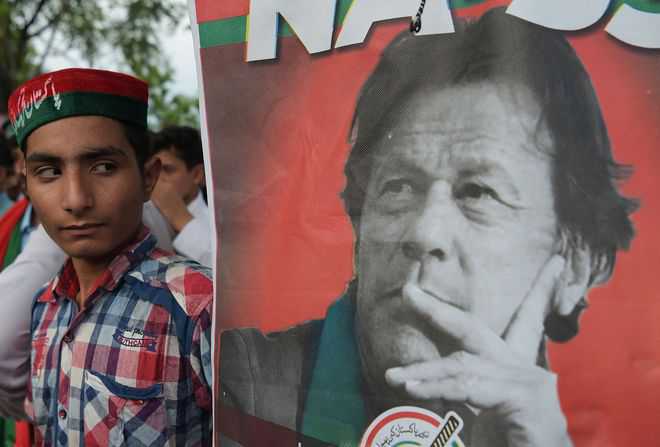
Can Imran, the favourite of the Pakistan army, deliver on his words? Pakistan’s Prime Minister-in-waiting Imran Khan has attained both prestige and notoriety. After 22-year-long struggle, he now occupies centre stage in the political arena after the elections backed by the army, marred by terrorist violence and substantive charges of rigging. The international community has questioned the extraordinary delay in the declaration of the official results. The primary concern for us, however, is how the new government in Pakistan will be disposed towards India. Imran is the pampered boy of the Pakistan army. Pinning high expectations on him would be a mistake at the moment. During his victory speech on July 26, he took off on a right note as he spoke of improvement in ties with India and the possibility of enhanced trade between the two countries as a panacea to deal with the massive problem of poverty in
the subcontinent.
That, he adroitly remarked, “should be the number one priority
of any government
(in Pakistan).”
Suddenly, it appeared that the ace bowler of yesteryear was reminded that he was bowling short length and that could be hit for a boundary. So, like all his predecessors and army Generals, he regurgitated the typical Pakistani charge against India for inflicting “huge sufferings on Kashmiris” through its military presence. First, he was violating his own stand of condemning constant blame game and also ignored the fact that the Indian Army was fighting Pakistan-armed militancy. Second, he made it look as if the Pakistan army was never in Swat, Balochistan and Waziristan. Imran took full advantage of the Indian difficulties in Kashmir caused by the proxy war that Pakistan has launched since the late 1980s. And to Pakistan’s advantage, New Delhi mishandled the place with its flip-flops. Former DGP of Jammu and Kashmir Gurbachan Jagat had told the Centre during the then US President Bill Clinton’s visit in March 2000 to convey it to the visiting dignitary that “if Pakistan wanted, militancy could be over in Kashmir in 15 days’ time.”Pakistan army chief Gen Qamar Javed Bajwa had told Pakistani Senate on December 20, 2017: “The military was ready to back political leadership’s initiative for normalisation of relations with arch-rival India.” He urged “political leaders to try and improve relations with India” and promised that “their efforts would be fully supported by the army.”Former Pakistan Prime Minister Nawaz Sharif was seeking to do that only, but then he was not the Army’s man, Imran is. A cartoon in The Times, London, succinctly said it all about the change in Pakistan’s landscape. It depicted an oversized military General guiding a dwarfed Imran in handling the bat at the
cricket pitch, and the
caption read: “opening partnership”.
Bluntly speaking, New Delhi cannot remain in an icy standoff state with Pakistan, though it has very valid reasons to maintain that “talks and terrorism cannot go together”. The real-time diplomacy demands that it should walk the talk but not because of those who want to put the cart before the horse. India should wait and watch how the new arrangement will pan out. This “favourite” factor can turn beneficial too as Imran has the support of the real establishment that calls the shots there. India should watch the developments closely, after all it has dealt with Gen Pervez Musharraf, who was a rare combination of military and civil power. Now, there are two faces – Imran and the Army.The word ‘reconciliation’ has to have a meaning. Let Pakistan take the first step in defusing tension, then India should not take two steps but hundreds of them to have a result-oriented round of walk the talk. There is an opportunity, but caution is necessary.

